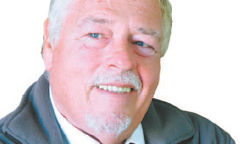
Brandi Thomas-Dobbs
February 17, 2016
PLAYER OF THE WEEK
February 18, 2016One of the cool things about this job is that you get to take field trips a lot of other people don’t, and have an excuse for looking up close at how various arms of government work. During my career I have done ride-alongs with police officers, traveled with an army preparing for war, and watched observers spot dolphins and sea turtles from a helicopter to make sure a powerboat race did not interfere with their well-being.
My visit to the FBI’s Lakefront headquarters in New Orleans, so far east in the city it’s almost in Mississippi, was one of those field trips.
Located behind heavily secured barricades, the offices are sleek and clean. The culture of the agency is apparent even in the men’s room, where on a counter rested a shoe-polishing sponge for anyone feeling the need to use it.
The meeting between FBI officials and local media was an opportunity to meet in person the Special-Agent-InCharge of the New Orleans Division, Jeffrey Sallett. Appointed in October, Sallett has a long and fabled history with the agency. At its New York Division, Sallett became a certifiable mob-buster, as the agent who brought Bonanno crime family boss Joseph Massino to justice, along with 100 mob associates. The team Sallett worked on solved 30 cold case murders related to the New York mob. He also made a mark in investigations of public corruption, labor racketeering and work on counterterrorism matters. Subsequent to the Boston Marathon bombings, Mr. Sallet was selected to manage the Boston Division’s counterterrorism and crisis management program, where he led the coordinated law enforcement response and investigation of the terrorist attacks. His knowledge and experience, in his current role, will be used to the benefit of the entire state of Louisiana, which his division serves.
Sallett spoke of his commitment to weeding out government corruption at all levels, which puts him clearly on the same page as the U.S. Attorney for the Eastern District of Louisiana, Kenneth Polite, who has demonstrated his commitment toward that end, as well as spoken of it.
The field trip also provided an opportunity to hear from experts in several fields, most prominently agents who specialize in investigating threats at businesses, schools and other places from potential mass murderers. A key point made at that time was that while some people may indeed make public pronouncements on social media or say things to friends that appear suspicious, there is a fine line between committing a crime relating to imminent plans and merely spouting off. Cops and FBI agents have to straddle that line with regularity, and the uncomfortable nature of it was made clear.
Demonstrations were also given relating to officer-involved shootings. Officers and agents don’t shoot to kill, we were assured, they shoot to stop. Sometimes, admittedly, one requires the other.
I have covered officer-involved shootings in several different states, including Louisiana. The experience has given me a pedestrian ability, at least, to determine whether what I was looking at clearly was an excessive use of deadly force, or something more justifiable.
Points relating to this were driven home when several of us volunteered to participate in a “shoot-don’t-shoot scenario” that is used for training agents. In a darkened room peopled by agents and colleagues, I was given a bright green, real-feeling 9mm pistol and stood in front of a television screen.
I went through three scenarios where larger-than-life video bad guys posed a threat, but initially showed no weapon. While I responded when it became clear there was danger to myself or someone else in the video scene, I didn’t do well. Actually, I died three times.
The lesson I carried away from the experience was a realistic understanding of the idea that such decisions are made or not made in a split second, with little room for error. It was a reminder of how blurred lines between right and wrong can be. I was reminded by an agent of how my decisions were made in the comfort of an air-conditioned room, with pre-existing knowledge that whatever happened, I would still be going home.
The experience in no way altered my understanding of how when officer-related shootings occur, scrutiny of the highest level is required. But it was also a reminder of how important it is to closely examine all aspects of a case, with the greatest care, when telling the story to all of you.
In that sense, even though I died three times, the field trip was a personal and professional success.
John DeSantis, green pistol in hand, is threatened by a video character at FBI headquarters in New Orleans.






